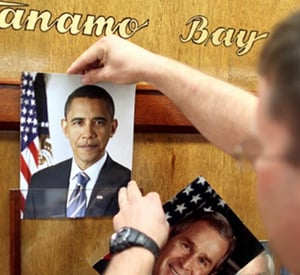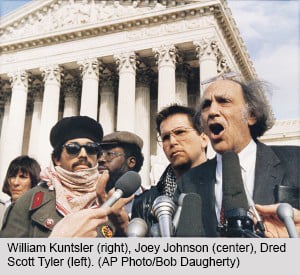

 |
 |
|
|
Trouble seeing this email? Read in your browser.
In This Issue:
Obama GITMO plan "too little, too late"When President Obama sent his long-awaited plan to close Guantánamo to Congress last Tuesday, CCR was ready with our analysis – and criticism – of the president’s past actions as well as his current proposal. In a press statement, a white paper, and dozens of media interviews that CCR attorneys did that day, we provided an important counter-voice to both mainstream cheerleading about Obama’s commitment to closing the prison and right-wing grandstanding vowing to expand the GITMO population. The centerpiece of the plan, moving detainees who have not been charged and never will be charged with any crime to a U.S. prison, does not “close Guantánamo”; it merely relocates it to a new zip code. As we said in our statement, “The infamy of Guantánamo has never been just its location, but rather its immoral and illegal regime of indefinite detention. Closing Guantánamo in any meaningful sense means putting an end to that practice.” For the rest, the Obama plan lays out several steps that CCR has been advocating for years, including releasing the prisoners who have been cleared for release – many of them for years—and speeding up the Periodic Review Board process. Our influence on the framing of the president’s plan was evident in some of the day’s headlines: 'No one but himself to blame': how Obama's Guantánamo plans fell through (Guardian), Obama's Plan to Close Guantánamo Would Establish Indefinite Detention on U.S. Soil (Intercept), Obama Is a Prisoner of Guantanamo: The president's latest plan to close the prison is barely a plan at all (U.S. News and World Report), Will Obama's Guantánamo Plan Close the Prison or Just Relocate It to a New ZIP Code? (Democracy Now), among others. Also check out this op-ed by CCR Legal Director Baher Azmy for Rolling Stone: Why Obama's Plan for Closing Guantanamo Is Unjust. Closing Guantánamo has never been an abstract idea for CCR. We have sat across from numerous clients who are imprisoned there and have seen first-hand what indefinite detention does to human beings. As CCR supporters – who make all of our efforts to close the prison possible – know, CCR attorneys travel to GITMO regularly to meet with our clients. This week, BJI Fellow Omar Shakir is at the prison meeting with Ghaleb Al-Bihani and Zahir Hamdoun. Troubling development in boycott caseLast week a judge allowed the case against the Olympia Food Co-op Board for its boycott of Israeli products to move forward, ruling against our motion to dismiss the case. It’s a troubling development given that judges have twice before found the suit targeted protected speech and was meritless. Davis v. Cox is a textbook example of how litigation can be used to penalize and chill free speech and, in particular, how it is used to undermine the Boycott, Divestment, and Sanctions (BDS) movement against the state of Israel for violations of international law, a critical tool in the struggle for Palestinian rights. It is but one tool among many others that opponents of the BDS movement have marshalled. Last year CCR and Palestine Legal released a first-of-its-kind report, “The Palestine Exception to Free Speech,” documenting the widespread and growing suppression of Palestinian human rights advocacy in the U.S., particularly on college campuses. We first filed a motion to dismiss Davis in 2011 under Washington’s anti-SLAPP (Strategic Lawsuit Against Public Participation) law. That motion was granted by the trial court and upheld by the appellate court. But then the plaintiffs appealed to the Washington Supreme Court, challenging the constitutionality of the anti-SLAPP law. The Washington Supreme Court struck down the anti-SLAPP statute as unconstitutional, so the case was returned to the trial court to proceed. We will continue to defend the former and current co-op board members and their right to boycott, and we will continue our strong support for the BDS movement. 
CCR at 50: Protecting your right to burn the flagIn 1989, the U.S. Supreme Court handed down a decision in the First Amendment case Texas v. Johnson. CCR co-founder William Kunstler and David Cole (then a staff member and later a board member) represented a protester who had burned the American flag as part of a protest against the 1984 Republican National Convention. Johnson remains a landmark free speech case, emphasizing that symbolic speech and expressive activity are protected, and specifically holding that Johnson’s burning of the flag was protected by the First Amendment. The court’s ruling struck down the Texas flag desecration law under which Johnson was convicted—as well as similar laws in 47 other states. The next year, Kunstler and Cole were at it again, back in the Supreme Court in United States v. Eichman, challenging the Flag Protection Act, a federal flag desecration law that had been passed in response to Texas v. Johnson. On the day the law took effect, Shawn Eichman and Gregory Lee Johnson (the defendant in Texas v. Johnson) burned a flag to protest the new law and were arrested under it. Once again, the high court struck down the law as a violation of the First Amendment. And in remembrance of the late Justice Antonin Scalia, who no one will be surprised to learn often ruled against CCR when our human rights and social justice work reached the high court, we want you to know that, at least in the flag burning cases, Scalia ruled in CCR’s favor. Maybe burn a flag in his honor? |